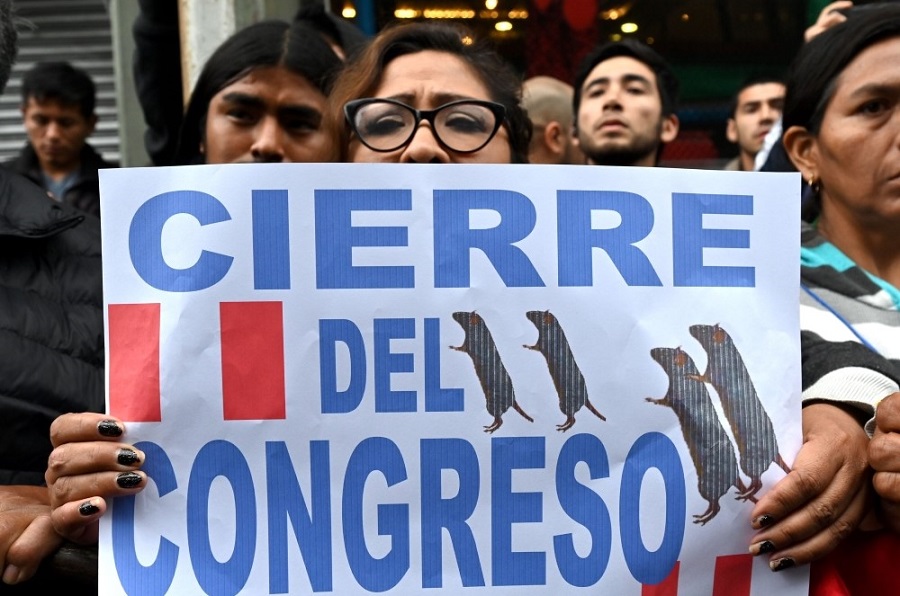RIO DE JANEIRO, BRAZIL – (BBC Mundo) Neither Pedro Castillo nor Keiko Fujimori, the two rivals for the presidency in the second round, will hold a sufficient majority in Congress for a smooth relationship with the Legislative.
The saga of disputes began with the Congress and the Executive elected in 2016. During his administration, Parliament lodged two impeachment motions against then president Pedro Pablo Kuczynski (PPK), and forced his resignation in March 2018, amid accusations of allegedly receiving bribes from Brazilian construction company Odebrecht.

PPK’s successor, Martin Vizcarra, dissolved Congress in September 2019 and called for parliamentary elections. The new Congress elected in January 2020 lodged two impeachment motions against Vizcarra: they rejected the first one and finally approved the second one. Vizcarra left the Government Palace, and after a long period of time he was replaced by Manuel Merino.
One of the latest episodes of this conflicting relationship between the Executive and the Legislative occurred last week, although without major consequences other than a few minutes of uncertainty.
A legislator lodged an impeachment motion against President Sagasti but his parliamentary colleagues refused to accept it for debate. A new Congress and a new Executive will be installed next July after the elections to select both branches of government were held on Sunday, April 11th.
In the case of the presidential elections, a second round between Castillo and Fujimori will be needed on June 6th. Whoever wins the second round will not hold a parliamentary majority, just like their predecessors.
This and other circumstances suggest that with the new Congress, which will be installed for a period of five years (in theory), there will also be conflict, as with the previous two.
Fragmented Congress
According to the National Office of Electoral Processes’ (ONPE) count, 10 parties will form Parliament, the largest number of groupings entering the legislature at the same time in the last 15 years.
“Congress is going to be very fragmented, as we had predicted,” Milagros Campos, an attorney and political scientist at the Pontificia Universidad Católica del Perú (PUCP), tells BBC Mundo.
“The greater the fragmentation, it is possible that there will be greater problems of governance, both in the relationship with the Executive – it means a double effort for the Executive to reach agreements – and within the Congress itself. Passing issues that require qualified majorities becomes more complicated,” warns Campos.
“With more parties it will be more difficult for them to agree on complex solutions to complex problems, because they would have to talk. Maybe they will agree on simple (or populist) solutions to complex problems and that scares me. I believe that the only way for there to be reforms is for the citizenry to push them,” says attorney and political scientist Javier Albán, host of the Opción Pública podcast.
Impeachment motions
When PPK won the elections in 2016, he secured 18 seats in Congress, out of a total of 130, a number far from the 44 he needed to protect him in case of impeachment, a measure that passes with 87 votes.
His successor, Vizcarra, did not present any list to the parliamentary elections that he himself called in 2020, so he lacked a party to protect him in an impeachment process.
According to the ONPE results, Castillo would have 37 legislators and Fujimori, 24. In other words, neither has the 44 votes to prevent any impeachment attempt.
“To finish their mandate and not be impeached they need to have a survival coalition of at least 44 legislators,” Campos tells BBC Mundo.
The use of impeachment “will depend on the alliances [between party benches] that are formed in Congress,” says Albán.
“If either of the two candidates manages to put together some coalition that assures them the 44 votes, they will have governability. But that is not certain now. It will depend on the second round campaign, on who the other parties support,” says Albán.
No reelection
In addition to the possible weakness of the Executive, another factor could make it easier for Congress to resort to measures such as impeachment.
In 2018, Vizcarra called for a referendum in which immediate parliamentary reelection was prohibited. That is, unless the rule changes, legislators elected in 2021 already know that they will not be able to be reelected in 2026.
“There is a relationship between how the politician behaves and whether or not they have re-election. A study in Brazil showed that officials tend to be less corrupt when there is a reelection than when they are not. Re-election is an incentive so that there can be control [in Congress],” says Albán.
Dissolution
If an impeachment does not occur, there is another “extreme” measure in the executive-legislative relationship: the president can dissolve Congress. According to the Peruvian Constitution, the Executive can dissolve it if it denies two motions of confidence to its ministerial cabinets.
The question of confidence is a constitutional mechanism that the president can apply in Congress if he feels that his political project is weakened. In other words, the president asks for a “vote of confidence” from Congress on a ministerial cabinet or a bill, for example.
Vizcarra dissolved Congress after it denied two questions of confidence since 2016.
“The president could present questions of confidence for controversial bills and if they don’t pass, he shuts down Congress,” he says. “As long as the Constitution is not modified” and the question of confidence is not better delimited, says Albán, Congress is exposed to dissolution by the Executive.
For Campos, “the healthiest thing for Peru is to form alliances that are not temporary, that have a longer term commitment and that seek to break the cycle of dissolutions and impeachments”.
This will be a challenge for Castillo or Fujimori and their supporting benches in parliament.
Source: BBC Mundo

